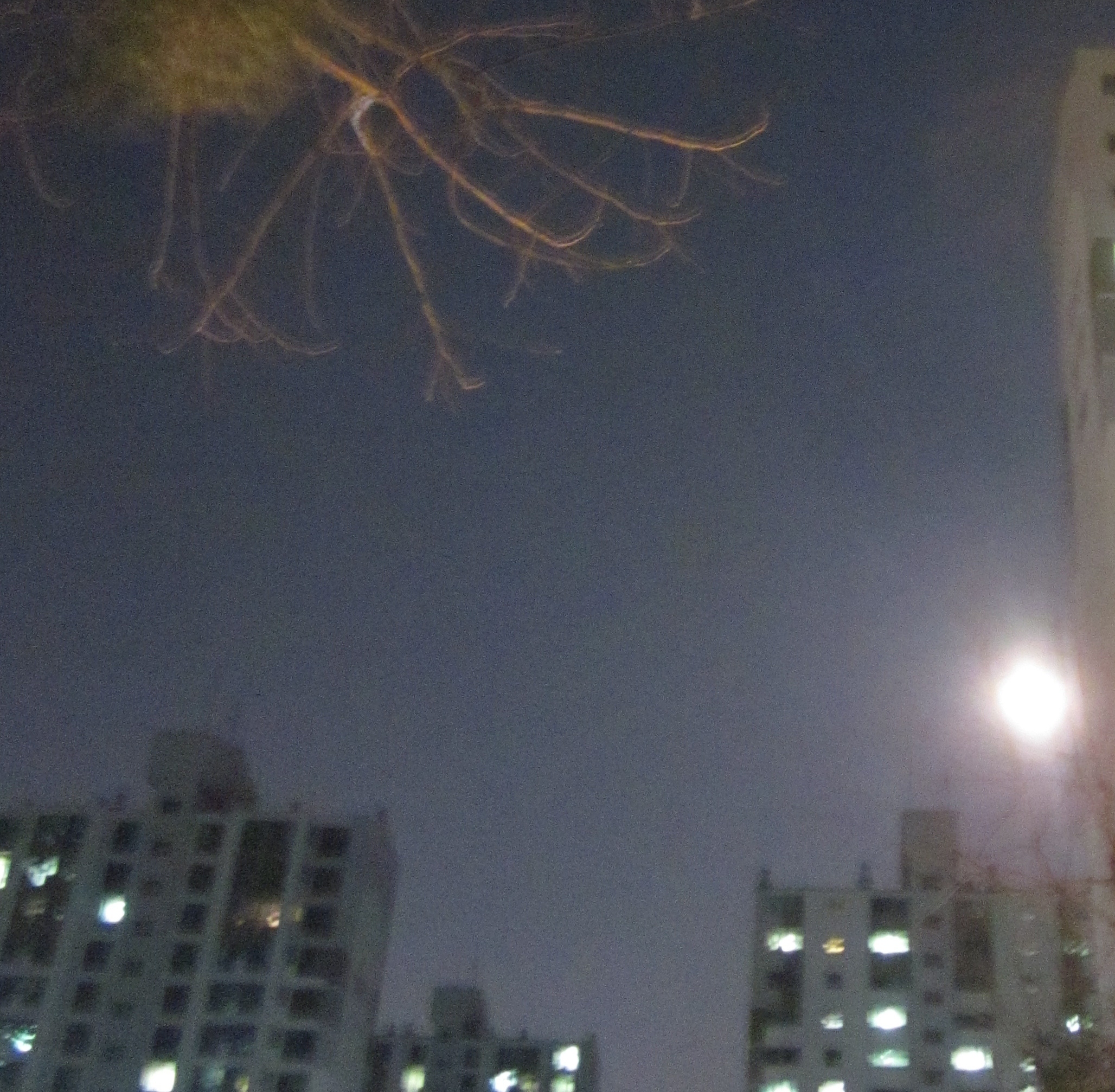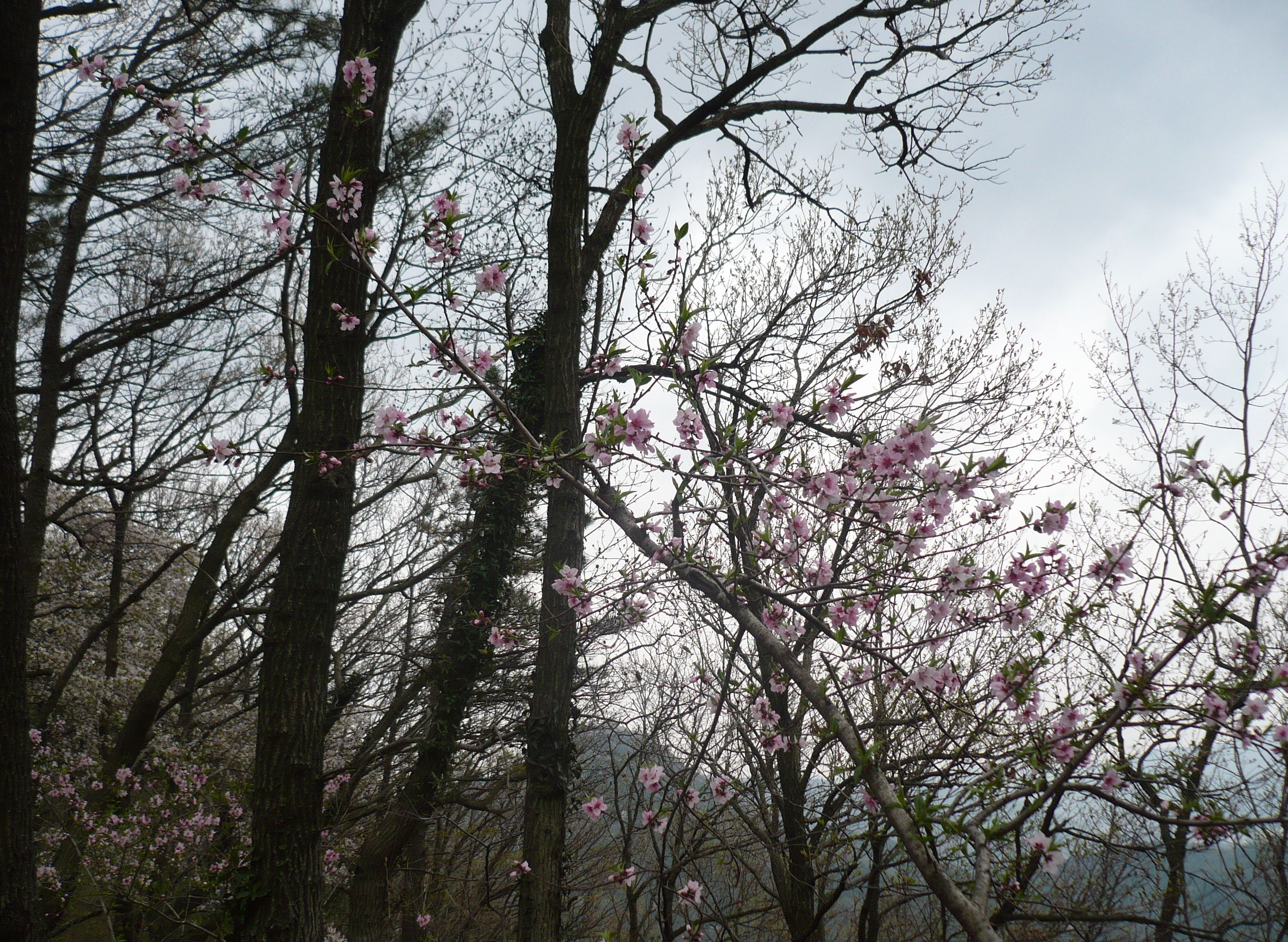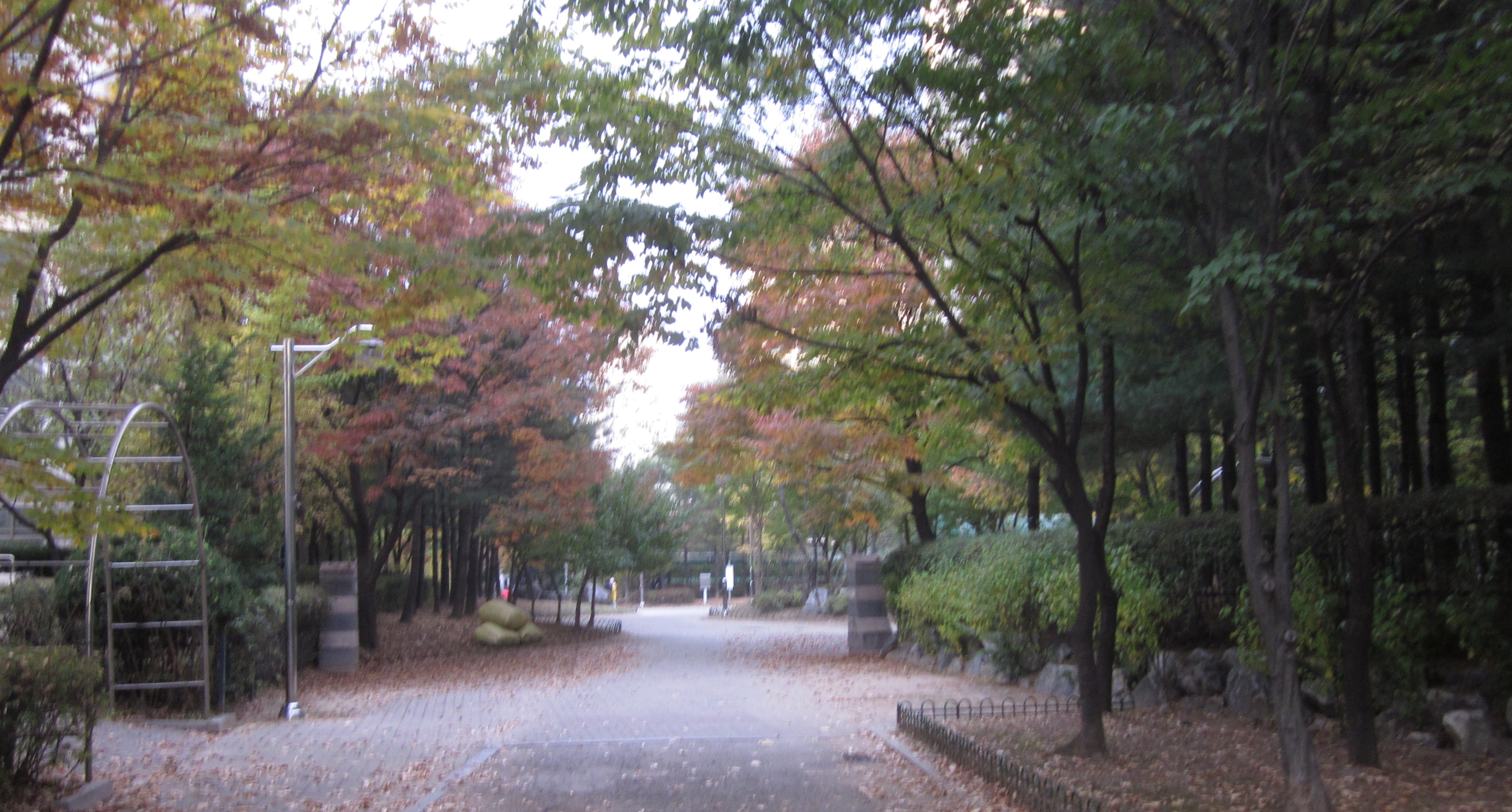 이밤에는 학원에서 시험대비 월간때문에 외롭고 슬픈 느꼈어요. 아마 전 중학생들을 보고 싶을 거예요. 그런데 집까지 걸어 오고 있으면서 밝고 흰 달을 봤고 예뻤어요. 그래서 맛있는 치즈와 토마토 샌드위치 먹었어요.
이밤에는 학원에서 시험대비 월간때문에 외롭고 슬픈 느꼈어요. 아마 전 중학생들을 보고 싶을 거예요. 그런데 집까지 걸어 오고 있으면서 밝고 흰 달을 봤고 예뻤어요. 그래서 맛있는 치즈와 토마토 샌드위치 먹었어요.
Category: 한국말을 배움 (Failing to Learn Korean)
Caveat: 공자 앞에서 문자 쓴다
공자 앞에서 문자 쓴다
Confucius front-LOC letter[character] write
[…Like] writing in front of Confucius.
This is a proverb that expresses the ridiculousness of trying to teach a master. “…Trying to teach your grandmother to suck eggs” is the equivalent classic English language proverb, but that’s an English-language one that is so far out of date as to be incomprehensible to modern speakers.
Caveat: 개천에서 용 난다
개천에서 용 난다
creek-from dragon comes-out
The dragon rises up from the stream.
This is the idea that a great person can emerge from poor circumstances.
Caveat: 걱정도 팔자다
Caveat: 남의 떡이 커 보인다
남의 떡이 커 보인다
other-person-GEN rice-cake-SUBJ is-big looks
Another person’s rice cake looks big[ger].
The grass is always greener on the other side of the fence. This is true. But I can never figure out if I even want grass or not. So to speak.
![]()
Caveat: 엎드려 절 받기
엎드려 절 받기
face-down bow receive-GER
[…like] receiving a bow [while?] face-down.
This means receiving a courtesy such as a bow and disregarding or ignoring it, according to the proverb guide I found. I suspect I make a lot of mistakes with this type of thing in Korea – the rules are so different from how courtesy normally works in Western culture, although I sometimes think they’re not as different as we think they are – they just seem really different.
I’m feeling really down. I’m engaging in major escapism, playing a game on my computer and ignoring reality.
Caveat: 하늘에서 별 따기
하늘에서 별 따기
sky-ABL star pick-GER
[…like] picking stars from the sky
Which is to say, trying to do something impossible. Pretty self-explanatory. I’ve not been very consistent in how I mark (terminologically speaking) word endings – I use so many different reference sources, and there’s certainly no consensus among those sources. I sometimes think of the -에서 ending as an ablative or simply “lative” case for nouns. And there is definitely something gerund-like in the -기 ending for verbs. Hence my choices for today, above.
The sky is overcast. It might rain later.
Caveat: 눈엣가시
눈엣 가시
eye-LOC thorn
A thorn in the eye.
This means the same as English’s “pain in the ass,” roughly. I was very proud to recognize the meaningless epenthetic -ㅅ on the LOCative case ending -에. I wonder whether it’s etymological – a typical linguist’s type of question...
Caveat: 뜻이 있는 곳에 길이 있다
뜻이 있는 곳에 길이 있다
will-SUBJ exists-ADJ place-LOC way-SUBJ exists
Where there’s a will there’s a way.
This proverb translates almost exactly to the English. I was almost shocked when it dawned on me that it was equivalent. Mostly, proverbs aren’t so easy to translate.
Not very useful advice, to someone such as myself who seems to be suffering primarily from willpower issues.
![]()
Caveat: 말보다 증거
말보다 증거
word-THAN evidence
Evidence [is better] than words.
Evidence for what?
I had a list of proverbs I was trying to go through them in order but I skipped about 5 of them, because they were too difficult to figure out. Seeing evidence of my poor Korean Language skill (and doing nothing about it) is better than learning new Korean vocabulary. There, that really confounds the intended meaning of proverb.
And here is the best explanation of this kind of problem.
Caveat: 망건 쓰자 파장된다
망건 쓰자 파장된다
manggeon sseu-ja pajang-doen-da
headband put-on-AS-SOON-AS [the exam] ends
“Put on the headband just when the exam is over.”
 There is a Korean tradition of putting on a headband (such as a traditional horsehair headband – 망건) before taking on some difficult challenge or task, such as taking a major exam or protesting against the government or some other huge challenge. This expression means that you don’t get around to putting on the headband until the challenge is basically past. It’s proverbial meaning therefore seems like something like “Frittering away opportunities.” Some dictionaries have, “muddling away one’s opportunity,” which is essentially the same.
There is a Korean tradition of putting on a headband (such as a traditional horsehair headband – 망건) before taking on some difficult challenge or task, such as taking a major exam or protesting against the government or some other huge challenge. This expression means that you don’t get around to putting on the headband until the challenge is basically past. It’s proverbial meaning therefore seems like something like “Frittering away opportunities.” Some dictionaries have, “muddling away one’s opportunity,” which is essentially the same.
Some translations have “Easier said than done,” instead. I don’t think this is the same thing at all. Thus, I would say the first interpretation above – “frittering away opportunities” – describes my life perfectly. The latter is not as close a fit.
Wait – lemme go put on my headband. I’ll get back to you.
Caveat: 독 안에 든 쥐
독 안에 든 쥐
poison inside-ABL entering rat
[Like] a rat going into the poison
A very bad situation that cannot be escaped from, supposedly. "Between a rock and a hard place," maybe.
Caveat: 그림의 떡
그림의 떡
picture-GEN ddeok
[like a] picture of a rice-cake
This means “pie in the sky” – which is to say, something you cannot have but fantasize about.
So that’s proverb for the day. Here’s a picture of ddeok (Korean style rice-cake) – there are thousands of different types and styles – this one looks rather delicious.
Caveat: 니가 해 봐
I overheard a student saying this in the lobby of work, and it was a fabulous moment, because I was able to parse it instantly. "니가 해 봐" [ni-ga hae bwa] means something like, "You try it!" It's a protest, where someone is complaining about something the other did, saying "oh, it's not big deal," and so the other says, "Well, you try it, then!"
Anyway, it's a tiny, incremental victory. That's all we get, in trying learn a language. But I'm happy to have had it.
Caveat: 모로 가도 서울만 가면 된다
모로 가도 서울만 가면 된다
sideways go-even seoul-only go-if becomes
Even going sideways one will only get to Seoul.
I’m not sure about the grammar of the last part – it seems to be a kind of periphrastic future using the verb 되다 (become). Regardless, this seems to offer a number of possible proverbial meanings. At first, it seemed to mean “All roads lead to Rome.” But looking it up, you also see offered “The ends justify the means,” as well as “It doesn’t matter which way you take to reach your destination.” These all seem related.
Yesterday I must have gone sideways into the subway, because I ended up in Seoul. But that doesn’t seem to happen much, as I commented – perhaps I don’t go sideways often enough?
Why do I spend so much time studying grammar, when it’s vocabulary that’s my problem? Because I enjoy studying grammar, whereas vocabulary causes me pain.
Caveat: 바늘도둑이 소도둑이 된다
바늘 도둑이 소 도둑이 된다
needle thief-SUBJ cow thief-SUBJ becomes
A needle thief [eventually] becomes a cow thief.
 This wasn’t to hard to translate – the verb is simple, the nouns straightforward. But what does it mean, proverbially? It’s the slippery slope argument, or the “gateway drug” argument. Starting small will still lead to perdition. Possibly true.
This wasn’t to hard to translate – the verb is simple, the nouns straightforward. But what does it mean, proverbially? It’s the slippery slope argument, or the “gateway drug” argument. Starting small will still lead to perdition. Possibly true.
I think the literal version of this would make an interesting short story, about a needle thief becoming a cow thief – better yet, while retaining his virtue. Or maybe a cow-thieving alien, who started out as a needle-thieving alien (see right).
Caveat: 발 없는 말이 천리 길 간다
발 없는 말이 천리 길 간다
foot not-having horse(word)-SUBJ thousand-mile journey goes
A horse with no feet [still] travels a 1000 miles.
 This is based on the pun on the fact the word for horse and the word for “word” are the same: 말 [mal]. So a “horse with no feet” is a word, or a rumor. It’s the idea that “rumors fly.” It wasn’t too hard to figure out, except I had to read something to figure out that the pun was going on. I just got the horse with no feet, but I suppose I’d have eventually figured out the pun.
This is based on the pun on the fact the word for horse and the word for “word” are the same: 말 [mal]. So a “horse with no feet” is a word, or a rumor. It’s the idea that “rumors fly.” It wasn’t too hard to figure out, except I had to read something to figure out that the pun was going on. I just got the horse with no feet, but I suppose I’d have eventually figured out the pun.
Caveat: 물 밖에 난 고기
물 밖에 난 고기
water out-AT coming-out fish
A fish out of water
This proverb wasn't difficult. I guess there's a first time for anything.
Unrelatedly, here's an interesting quote – yet another thing I can hit myself with when I contemplate my lack of progress in language-learning: "Opportunity is missed by most people because it is dressed in overalls and looks like work." – Thomas Edison. I am constantly missing opportunities to learn Korean because of this exact problem. My inherent laziness kicks in.
Caveat: Then Why?
After learning that I'd been in Korea for more than four years, my new(-ish) student, Sumin, a 7th grader with amazingly good English, only had one question: "Then why is your Korean so poor?"
Indeed.
I'm now plunged into a black, black depression.
Why, indeed, is my Korean so poor? Am I lazy? Inept? Hopeless as far as learning this language?
Caveat: 백지장도 맞들면 낫다
백지장도 맞들면 낫다
blank-sheet-EVEN lift-up-together-IF improve
Even a blank sheet [of paper], if lifted together [as a team], [things] improve.
Wow that was difficult! Why do I even try these proverbs. The key to making sense of this was understanding the verb 맞들다, which seems to mean “lift up together, join forces, cooperate as a team.” But even then, the syntax seemed fragmentary, missing too many elements. The proverb-to-proverb translation would be “Two heads are better than one.”
I had to cheat in order to make sense of this. My first draft, pre-cheat, was “if one hundred hinderances are tasty, things improve.” I thought it might be something weirdly Buddhist. I had carelessly mis-read (and mis-re-typed into the dictionary) the subordinate verb as 맛들다 [to be tasty, to become delicious], which would have the same pronunciation as 맞들다, but a slightly different spelling. And I had mis-parsed the noun phrase at the beginning as 백-지장 instead of 백지-장, hence the “one hundred hinderances” – but I’d made a mistake too, since that’s not really accurate given the need for a COUNTER particle if you’re going to count things.
Caveat: 귀천
The below is apparently a very famous poem in Korea. I find it notable that the author was imprisoned and tortured by the dictatorship in the 1960’s.
귀천 / 천상병
나 하늘로 돌아가리라.
새벽빛 와 닿으면 스러지는
이슬 더불어 손에 손을 잡고,
나 하늘로 돌아가리라.
노을빛 함께 단 둘이서
기슭에서 놀다가 구름 손짓하면은,
나 하늘로 돌아가리라.
아름다운 이 세상 소풍 끝내는 날,
가서, 아름다웠더라고 말하리라…..Back to Heaven
by Cheon Sang-Byeong
I’ll go back to heaven again.
Hand in hand with the dew
that melts at a touch of the dawning day,
I’ll go back to heaven again.
With the dusk, together, just we two,
at a sign from a cloud after playing on the slopes
I’ll go back to heaven again.
At the end of my outing to this beautiful world
I’ll go back and say: It was beautiful. . . .
(translation by someone who goes by “Brother Anthony“)
I took the picture below in April, 2010. Somewhere near Gwangju.

![]()
Caveat: 깐죽거리다
A few days ago, I overheard the phrase 깐죽 at work, in the context of the English word “smart ass.” Ever since, I’ve been trying to puzzle out if there’s something equivalent, there, but the more I try to figure it out, the more I don’t think they’re really the same thing. You can imagine, though, why having a Korean phrase for “smart ass” might be useful to a teacher of elementary age Koreans with limited English ability.
There is nothing in the online Korean-English dictionaries for 깐죽 or its verbal derivatives (as reported to me by coworkers: 깐죽거리다, 깐죽대다). The Korean-Korean dictionaries didn’t seem very useful (or maybe I didn’t understand them well enough). Naver.com, for example, says, “쓸데없는 소리를 밉살스럽고 짓궂게 들러붙어 계속 지껄이다.” This is, in itself, hard to take apart, and it took some time pooking around google translate (plus the dictionary and some grammatical knowledge, because google translate is, by itself, useless for Korean-to-English) to even get the gist of it, which is something like, “To chatter on uselessly and harassingly in a vulgar manner.”
 While I can see why someone would draw the link between a phrase meaning that, and the English “smart ass,” they’re still not really the same, as it neglects the “smart” part of it – the fact that a smart-ass doesn’t just chatter uselessly, but that the smart-ass has an aspect of “too smart for his/her own good.”
While I can see why someone would draw the link between a phrase meaning that, and the English “smart ass,” they’re still not really the same, as it neglects the “smart” part of it – the fact that a smart-ass doesn’t just chatter uselessly, but that the smart-ass has an aspect of “too smart for his/her own good.”
One translation I found encouraging was in the lyric of a song called 청춘고백 by Outsider (image, right), translated here. The translation offered for 깐죽거리던 is “snarky” – which is closer to “smart-ass,” definitely.
Conclusions? None, really.
“깐죽” seems to be related to the idea of talking too much, and/or out of turn, and/or vulgarly, but I don’t see much to suggest it implies speaking in “smart-ass” way specifically. So it only means smart-ass in the more broad meaning of the latter term.
What I’m listening to right now – the song I mentioned.
Outsider (아웃사이더 [a-ut-sa-i-deo]), “청춘고백.”
This is Korean rap/r&b. Awesome.
Caveat: 빈 수레가 요란하다
빈 수레가 요란하다
empty cart-SUBJ is-loud
An empty cart is loud.
“He who speaks most knows least,” roughly.
Maybe I should shut up.
What I’m listening to right now.
Washed Out, “Amor Fati.”
Caveat: turns out, taking a boat up a mountain isn’t that useful
As an update to my previous post, I followed up with a co-worker regarding my confusion as to how "If there are a lot of boatmen, the boat goes up the mountain," can mean the same thing as "too many cooks spoil the broth."
I had been visualizing a group of men working together to get a boat up a mountain, which would, naturally, be a difficult thing, and therefore a positive accomplishment, unlike spoiling broth. Hence my confusion. But, in fact, it turns out taking a boat up a mountain isn't perceived as useful.
I'm going to offer a slightly altered translation that, I think, makes this more negative connotation more clear in English: "If there are a lot of boatmen, the boat ends up far from water."
This removes the seemingly positive implicatures of getting the boat "up" a mountain, which apparently aren't present in the Korean – that's because the "going up" thing is inherently viewed as positive in English, but there's no "upness" involved in the Korean – it's that "lative" case ending I was preoccupied with, in fact: it means "into the mountain" meaning nothing more than "inland" (since all of the "inland" in Korea is mountain, this makes sense.
OK. So that explains it.
Caveat: 사공이 많으면 배가 산으로 올라간다
boatman+SUBJ many+IF boat+SUBJ mountain+LAT goes-up
If there are many boatmen the boat goes up the mountain.
I spent a long time trying to figure out what to call the -으로 [-euro = +LAT] ending. By my abbreviation, you can see that I’ve decided to call it a “Lative” case marker (q.v.), which I’ve never seen in any grammar of Korean. I’m just being an obstreperous and idiosyncratic avocational linguist, right? The ending indicates “direction toward” or “direction through” but also “manner” or “means,” and, as far as I can figure out, in colloquial usage it can be a “destination.” It is very common.
This wasn’t that hard to figure out, as far as semantics. But when I saw what the proverb was supposed to be equivalent to, I became puzzled. It’s said to be equivalent to: “Too many cooks spoil the broth.” Frankly, that seems to be exactly the opposite of its meaning, which is to say, with enough people (boatmen), anything is possible (getting a boat up a mountain).
I’m going to have to ponder this. I wonder if the important idea is that of the “boatman” in opposition to, maybe passengers (who aren’t as useful in getting the boat anywhere?).
Personally, I have no idea how to get from A (If there are many boatmen the boat goes up the mountain) to B (Too many cooks spoil the broth). Perhaps I need more boatmen?
Actually, I started thinking about Fitzcarraldo. Seriously – it’s exactly the same.
Caveat: 빛 좋은 개살구
 This only means, “The radiance (luster) [of] a good apricot.” 빛 [bit = light, radiance, luster] 좋은 [joheun = good] 개살구 [gaesalgu = apricot].
This only means, “The radiance (luster) [of] a good apricot.” 빛 [bit = light, radiance, luster] 좋은 [joheun = good] 개살구 [gaesalgu = apricot].
This is one of those proverbs where knowing its (semantic) meaning tells you nothing about its (pragmatic) meaning. Pragmatics is not semantics.
So I just went ahead and looked it up. It’s used the way we use: “All that glitters is not gold.”
Good to know. Dried apricots are generally available at local grocery stores. I often buy them.
Caveat: 맨끝에 정든다
I’ve been fishing around for some new activity to replace my year-long effort to translate the 108 Buddhist aphorisms. The 108 were the right level of difficulty – they were quite hard in some ways, but because I was somewhat familiar with the subject matter (i.e. Buddhism) and they were predictable (they followed patterns) I could manage them.
I’ve been looking at various lists of Korean proverbs and aphorisms. Every time I try to understand one (without looking at the translation), I don’t do very well. But I’m still tempted to mess with it, because I like proverbs and aphorisms, and they give a lot of insight into culture.
Here’s a proverb from one of those lists.
맨끝에 정든다
only-end-AT attachment-begins
“Only at the end does one grow attached.”
I take the verb to based on the root 들다 which would mean it’s irregular in a way I didn’t realize (dropping -ㄹ)
I think the 정 [jeong] here is the same 정 (情) [sentiment, attachment, love] I’ve discussed previously.
I didn’t select this proverb because it seemed particularly relevant to any of my current life events – I only selected it because it popped out of the list as something I might be able to figure out in a reasonable amount of time.
Maybe I’ll try to do a more-or-less randomly selected proverb a couple times a week. We’ll see how that develops.
Caveat: 옹알이
… 오늘의 단어: 옹알이 — “아직 말을 못하는 어린아이가 혼자 입속말처럼 자꾸 소리를 내는 짓” (네이버 국어사전).
(내가 작성한) 보기:
불행하게도 나는 한국말을 잘 못 한데, 단지 아기처럼 옹알이할 수 있어요.
Caveat: 108) 부처님. 오늘 지은이 인연 아낌없이 시방 법계에 회향하며 절합니다
“Buddha. I bow and turn today to the realm of Buddha now in generosity and kindness.”
This is the last of a series of 108 daily Buddhist affirmations that I have been attempting to translate. I started, almost accidentally, in September of 2010, and now I’ve reached the last one. I can’t guarantee the results, as I don’t really know Korean very well, but it’s been nice to try.
…
106. 부처님. 저는 선지 식을 만날 수 있기를 발원하며 절합니다.
“Buddha. I bow and pray to be able to find the ways of the prophets.”
107. 부처님. 저는이 세상에 부처님이 오시기를 발원하며 절합니다.
“Buddha. I bow and pray that Buddha comes into the world.”
108. 부처님. 오늘 지은이 인연 아낌없이 시방 법계에 회향하며 절합니다.
I would read this one hundred eighth affirmation as: “Buddha. I bow and turn today to the realm of Buddha now in generosity and kindness.”
This was difficult. I didn’t know what to do with “인연” (probably “karma” in this context) – so I ignored it as a gratuitous extra noun. There was nothing for it to “attach to,” grammatically. I had all these adverbs (“in kindness,” “in generosity,” “today,” “now”) but no verbs to attach to.
So I finish with the same doubts and ambivalences as I started with. As I’ve said in other places in this blog, I’m feeling very discouraged about my progress in learning Korean. I’m not doing very well with it. Having these little translations to turn to over the last year has been a good way to recover some focus on this project, so I’m going to miss it. I’m fishing around for a replacement project, but so far I haven’t come up with anything.
“We are here on Earth to fart around. Don’t let anybody tell you any different.” – Kurt Vonnegut, A Man Without a Country, 2005.
![]()
Caveat: 107) 부처님. 저는이 세상에 부처님이 오시기를 발원하며 절합니다
“Buddha. I bow and pray that Buddha comes into the world.”
This is #107 out of a series of 108 daily Buddhist affirmations that I am attempting to translate with my hands tied behind my back (well not really that, but I’m deliberately not seeking out translations on the internet, using only dictionary and grammar).
…
105. 부처님. 저는 수행하는 마음이 물러나지 않기를 발원하며 절합니다.
“Buddha. I bow and pray not to withdraw from a functioning mind.”
106. 부처님. 저는 선지 식을 만날 수 있기를 발원하며 절합니다.
“Buddha. I bow and pray to be able to find the ways of the prophets.”
107. 부처님. 저는이 세상에 부처님이 오시기를 발원하며 절합니다.
I would read this one hundred seventh affirmation as: “Buddha. I bow and pray that Buddha comes into the world.”
What I’m listening to right now.
[UPDATE 2024-04-19: The link to the music video rotted. Because yay internet.]
정재은, “당신과 둘이라면.” This is a genre of music called 트로트 [teuroteu “trot”] and it is the Korean cultural equivalent of country-western music in the US, or maybe norteño music in Mexico. Basically, the genre consists of Korean folk-songs and love ballads, with cheesy 70’s-style backing music. Also please pardon the cheesy Korean historical-drama screenshot on the youtube I found with the song.
Caveat: 106) 부처님. 저는 선지 식을 만날 수 있기를 발원하며 절합니다
“Buddha. I bow and pray to be able to find the ways of the prophets.”
This is #106 out of a series of 108 daily Buddhist affirmations that I am attempting to translate with my hands tied behind my back (well not really that, but I’m deliberately not seeking out translations on the internet, using only dictionary and grammar).
…
104. 부처님. 저는 반야 지혜가 자라기를 발원하며 절합니다.
“Buddha. I bow and pray to grow in wisdom.”
105. 부처님. 저는 수행하는 마음이 물러나지 않기를 발원하며 절합니다.
“Buddha. I bow and pray not to withdraw from a functioning mind.”
106. 부처님. 저는 선지 식을 만날 수 있기를 발원하며 절합니다.
 I would read this one hundred sixth affirmation as: “Buddha. I bow and pray to be able to find the ways of the prophets.”
I would read this one hundred sixth affirmation as: “Buddha. I bow and pray to be able to find the ways of the prophets.”
I’m not sure about “ways of the prophets” for “선지 식” – but just “the prophets” made me uncomfortable. “식” means “ceremony” or “rite.” I decided to make it “ways.”
I have two affirmations left. Raggedsign day is approaching. I think I will make my last post on that anniversary. Another finishing, another beginning. Year 13 of my life as ghost-in-the-world draws to a close.
[Picture: Saul on the road to Damascus]
Caveat: 105) 부처님. 저는 수행하는 마음이 물러나지 않기를 발원하며 절합니다
“Buddha. I bow and pray not to withdraw from a functioning mind.”
This is #105 out of a series of 108 daily Buddhist affirmations that I am attempting to translate with my hands tied behind my back (well not really that, but I’m deliberately not seeking out translations on the internet, using only dictionary and grammar).
…
103. 부처님. 저는 보살행을 실천하며 살아가기를 발원하며 절합니다.
“Buddha. I bow and pray to live and practice toward becoming a bodhisattva.”
104. 부처님. 저는 반야 지혜가 자라기를 발원하며 절합니다.
“Buddha. I bow and pray to grow in wisdom.”
105. 부처님. 저는 수행하는 마음이 물러나지 않기를 발원하며 절합니다.
I would read this one hundred fifth affirmation as: “Buddha. I bow and pray not to withdraw from a functioning mind.”
Or… functioning heart. Or heart that functions. Mind and heart: 마음. It’s not so much linked to a specific organ in the body, as the western terms are, as to the function of feeling, I think.
I like this affirmation. It seems to be saying: trust your feelings. Follow them. Maybe I’m wrong. I don’t know.
I’m running out of affirmations. I can’t decide what I’m going to replace this amazingly regular blog-feature with, when I run out. Any suggestions, O universe? I guess I’ll just follow my heart.
Not at all related, and maybe even somewhat inappropriate… what I’m listening to right now.
Eisbrecher (a German goth/industrial rock group), “Schwarze witwe” (black widow). The song seems to be about vampiric sex, or something like that. I’m not so good at understanding German – but I never let a failure to understand a language interfere with my ability to enjoy it. So I have a lot of music in various languages that I barely understand in rotation among my mp3 files – German, Japanese, Portuguese, Korean, etc.
Caveat: 104) 부처님. 저는 반야 지혜가 자라기를 발원하며 절합니다
“Buddha. I bow and pray to grow in wisdom.”
This is #104 out of a series of 108 daily Buddhist affirmations that I am attempting to translate with my hands tied behind my back (well not really that, but I’m deliberately not seeking out translations on the internet, using only dictionary and grammar).
…
100. 부처님. 저는이 세상에 전쟁이 없기를 발원하며 절합니다.
“Buddha. I bow and pray not to be at war with the world.”
101. 부처님. 저는이 세상에 가난이 없기를 발원하며 절합니다.
“Buddha. I bow and pray not to be destitute in the world.”
102. 부처님. 저는이 세상에 질병이 없기를 발원하며 절합니다.
“Buddha. I bow and pray not to suffer sickness in the world.”
103. 부처님. 저는 보살행을 실천하며 살아가기를 발원하며 절합니다.
“Buddha. I bow and pray to live and practice toward becoming a bodhisattva.”
104. 부처님. 저는 반야 지혜가 자라기를 발원하며 절합니다.
I would read this one hundred fourth affirmation as: “Buddha. I bow and pray to grow in wisdom.”
I have no idea what “반야” is – is it a verb with a “-야” ending, or a noun that I can’t find in the dictionary? The only dictionary meaning found was “midnight” which makes no sense. I basically ignored it in the above effort at translation.


